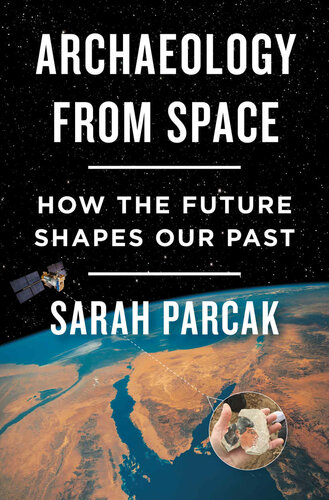
Archaeology from Space
How the Future Shapes Our Past
کتاب های مرتبط
- اطلاعات
- نقد و بررسی
- دیدگاه کاربران
نقد و بررسی

April 29, 2019
Anthropology professor Parcak spiritedly educates general audience about an expanding new field that applies “air- or space-based data” to study landscapes and thus increase understanding of human history. For example, Brazilian archaeologists found satellite evidence suggesting over a million people lived in part of the Amazon basin during pre-Columbian times. Parcak humanizes her topic by tracing her interest in it to her grandfather, a WWII-era Army paratrooper who, after the war, applied his aerial-photograph-analysis skills to forestry, inventing a then-revolutionary way to gauge tree heights. She also looks at the evolution of space archaeology, tracing it to a NASA intern, Mary Marguerite Scalera, who first identified its potential in 1970. Parcak even offers her audience the opportunity to participate; she founded GlobalXplorer, an online platform that uses crowdsourcing to analyze satellite images to, as she said during the 2015 TED talk that secured her funding, “find and protect the world’s hidden heritage, which contains clues to humankind’s collective resilience and creativity.” At the conclusion, Parcak notes that, since GlobalXplorer’s founding, more than 80,000 users from over 100 countries have contributed their time to looking at satellite images. Bolstered by this empowering pitch for the general reader’s involvement, Parcak’s book provides a revelatory look at an exciting new field.

June 1, 2019
A renowned space archaeologist gives readers an insider's look at her field, which is basically Indiana Jones meets cutting-edge satellite technology. It's every bit as exciting as it sounds. Discovering ancient civilizations by digging them up has always had grand romantic appeal. Parcak (Anthropology/Univ. of Alabama, Birmingham; Satellite Remote Sensing for Archaeology, 2009), the president and founder of GlobalXplorer and winner of the TED Prize, was among a generation of kids wooed by archaeology in movies like Raiders of the Lost Ark. But unlike most of us, she followed through on her passion, committing early to archaeology and pioneering the use of advanced technologies as a means to significantly improve the chances of the discovery of a lost site. Such excavations offer much more than just a cache of dusty loot; as she writes, "that dirt contains nothing less than the clues to who we are, how we got here, and how we might thrive in the future." In this fascinating adventure memoir, the author describes how remote sensing technology powered by orbiting satellites has transformed archaeologists' ability to locate and verify sites that might otherwise never have been discovered. As the lead in many big discoveries around the world, from Egypt to Newfoundland, Parcak has a lot of great stories to tell, and she tells them with clarity, enthusiasm, and humor. She also looks into the future, explaining that artificial intelligence and DNA analysis could further push the field into territory that only recently would have been considered sci-fi. And then there is crowdsourcing: The author is optimistic that regular people have the power to "find and protect the world's hidden heritage" through the online mapping of millions of undiscovered sites. Us, space archaeologists? There is no doubt that she will have no shortage of volunteers. Exciting and futuristic, this book elicits that anything-is-possible feeling--a must-read.
COPYRIGHT(2019) Kirkus Reviews, ALL RIGHTS RESERVED.

June 14, 2019
National Geographic fellow Parcak (anthropology, Univ. of Alabama), founder of the GlobalXplorer online platform, on which her award-winning TedTalk is based, here relies on her popularization of technology-assisted archaeology to help people better comprehend past civilizations in order to better understand themselves. The author begins by paying homage to her inspirations: her forestry professor grandfather of Indiana Jones character. The personal narrative brings an immediacy to the text and includes many anecdotes, from her fan-girl reaction to meeting Harrison Ford to her yell of excitement over a data set. Parcak vividly shares the excitement of excavating at places such as Tanis, Egypt, as well as her thoughts about the numerous archaeological sites that are still undiscovered. VERDICT An engaging read for both teens and adults interested in satellite remote sensing and other technologies as well as archaeology. They will learn some intriguing things about civilizations in the process.--Sara R. Tompson, Lawrence, KS
Copyright 2019 Library Journal, LLC Used with permission.

June 1, 2019
The title of this book is likely to draw second looks, but it's not hyperbole. Space, or satellite, archaeology is a real discipline and it's creating enormous opportunities for gaining critical knowledge; the discoveries in the Amazon region alone are galvanic. Parcak is an Egyptologist, National Geographic Explorer, professor of anthropology, and winner of a TED Prize. While her main focus is on how advanced satellite technology is being used to locate long-lost archaeological sites, she also shares many personal experiences as an archaeologist, from the most prosaic (digging fruitlessly in the dirt for days) to the highly entertaining (dining with Harrison Ford). Parcak is an extremely engaging writer and she has done a lot of very interesting stuff. There is not only her crucial work in Egypt, but also searching for lost Viking settlements in Canada, studying hidden evidence of the Mayans, and so much more. Parcak shares enough of herself to entrance anyone who shares her Indiana Jones dreams, while elucidating the exciting new field of satellite archaeology. This is a thoroughly delightful and downright fascinating work of popular science.(Reprinted with permission of Booklist, copyright 2019, American Library Association.)

























دیدگاه کاربران